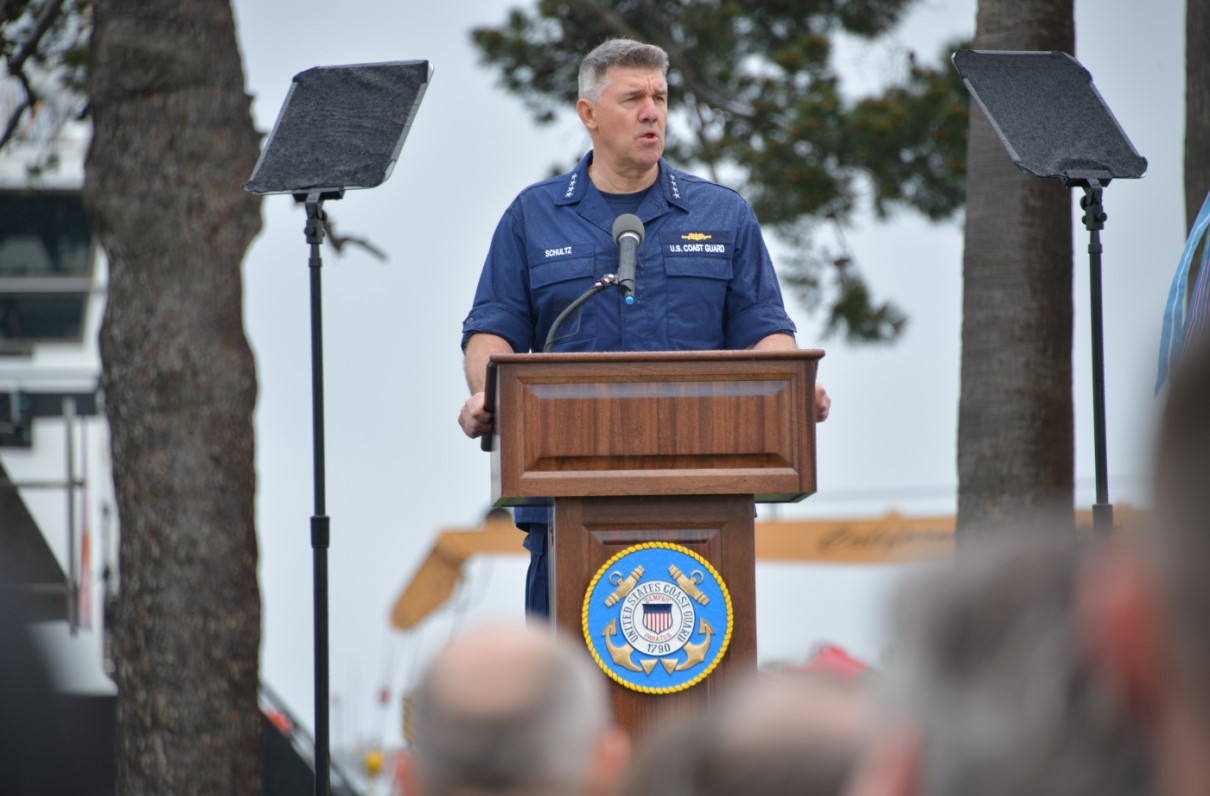This article by Patricia Kime originally appeared on Military.com, the premier resource for the military and veteran community.
The U.S. Coast Guard continues to experience a "hangover effect" from the 35-day government shutdown earlier this year, but continues to focus on homeland and national security missions such as Arctic operations, maritime transportation, drug interdiction and disaster response, the service's top officer said.
In his first "State of the Coast Guard" speech March 21 in Los Angeles, California, Coast Guard Commandant Adm. Karl Schultz said the service will require a 5 percent annual increase in operating and support monies to ensure operational readiness.
It's unfair, he said, not to provide sufficient operating and support funding to maintain the current fleet, train and equip service members and support their families.
[MOAA Interview: Coast Guard Commandant Adm. Karl Schultz]
According to Schultz, the service's operations and support budget has "flatlined" in the past eight years, resulting in a $1.7 billion backlog of deferred maintenance, outdated information technology and a "strained and undersized workforce."
"That's particularly problematic for an organization with facilities spread far and wide across the nation," Schultz said. "In addition, we need to build modern infrastructure to support home porting our newest assets, including polar security and offshore patrol cutters."
The Department of Homeland Security has requested $11.3 billion for the Coast Guard for fiscal 2020, an increase of 7 percent from the previous year.
The proposed and current budgets would fund adding the ScanEagle unmanned aerial system on the service's national security cutters, several offshore patrol cutters, the next icebreaker (the fiscal 2019 budget funded the service's first new icebreaker in 20 years as well as preliminary parts for the next), and several new offshore patrol cutters and fast response cutters.
[RELATED: The President's Budget: What Can We Expect Next?]
Schultz said he hoped Congress would recognize the importance of the service's budget request.
"I feel well supported by Secretary [Kirstjen] Nielsen and the administration ... it allows us to sustain frontline operations. But what I said today, and I won't shy away from it, we've been kind of flatlined. And if I have the opportunity to talk about Coast Guard readiness, that's the place I am most concerned."
Against a backdrop of the ports of Los Angeles and Long Beach, Schultz, who has been in the Coast Guard's top position for eight months, said the service is vital to the U.S. economy, with 90 percent of U.S. trade coming into ports, and protecting vessels on U.S. waterways by ensuring safe transit. It is upgrading the technology for its 600 marine inspectors and following a new maritime commerce strategic outlook to ensure that everyone associated with marine commerce stays focused.
The Coast Guard also continues to conduct counter-drug operations, capturing 1.4 million pounds of cocaine in the past three years, and it is gearing up for a mission it has spent more than a decade trying to call attention to: Arctic patrols.
[RELATED: Cutting a Lonely Path: This is the Coast Guard's Sole Heavy Icebreaker]
Schultz said the country needs six icebreakers, including three of the largest, the polar security cutter. It currently has one heavy icebreaker in working order, the 43-year-old Polar Star, and that suffered a fire during its most recent deployment that caused crew members to endure 30-degree bilge water during repairs.
"I'm proud to say we will award the construction contract this spring for our first [new icebreaker]," Schultz said.
A congressional champion for the icebreaker funding, Sen. Lisa Murkowski, R-Alaska, attended the speech and said in remarks that the U.S. desperately needs to increase its presence above the Arctic Circle.
"We are an Arctic nation. We may not look like it, standing in the sunshine here in this beautiful environment, but we are," she said.
During his speech, Schultz made a number of personnel announcements, to include providing tuition assistance to members of the Coast Guard Reserve.
[MORE FROM MILITARY.COM: Coast Guard Eyes Changes to Physical Standards, Tattoo Policy to Retain Troops]
He later added that he plans to expand the Coast Guard's reserve component.
"[It's] a key element of our operational success, which is why we are shifting governance of our reserve program directly under our deputy commandant for operations," Schultz said.
Other articles by Military.com:
First Enlisted Woman to Try for Air Force Special Operations Weather Career
Two US Service Members Killed in Afghanistan
USAF Academy Welcomes 9-Year-Old with Cancer as 'Youngest Cadet'



